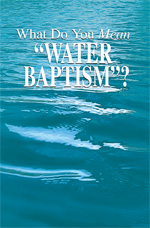Another year has passed and soon God’s people will be packing clothes, loading cars, and boarding planes, buses or boats to travel to the Feast of Tabernacles—the most joyous time of the year. Brethren will come from the four corners of the world to gather at the places God has put His name.
Most likely, prior to the Feast, you will be running around trying to get loose ends tied up. You have to buy any necessary clothes for the Feast, get the oil changed in your car, take the dog to the kennel, clean out your refrigerator, pack and so on.
Sometimes, with all the busyness and things to be done, we can forget to slow down enough to ask the bigger questions.
Throughout Leviticus 23, God commands His people to keep the Holy Days as a statute forever. He outlines the seven days of the Feast of Tabernacles and how brethren are to leave their homes to gather together and stay in temporary dwelling places. But why does He want His people to do this?
Understanding the big picture can help us better appreciate and maximize our experiences during these Holy Days.
So in the midst of all your Feast preparations, take a moment to ask yourself, “Why do I attend the Feast of Tabernacles? What am I here to learn?”
Here are three crucial lessons about the Feast and what God intends for us to learn during this special time of year.
Learning to Fear God
Deuteronomy 14 gives further instruction regarding the Feast and the first lesson we are to learn: “You shall truly tithe all the increase of your seed, that the field brings forth year by year. And you shall eat before the Lord your God, in the place which He shall choose to place His name there, the tithe of your corn, of your wine, and of your oil, and the firstlings of your herds and of your flocks; that you may learn to fear the Lord your God always” (vs. 22-23).
People are afraid of many different things, and most think of fear as only the emotional response to danger, pain or threats. But the fear of God is not terror or horror. Rather, it is having a sense of reverence, awe, worship and deep respect for our Creator. It motivates us to want to obey Him.
But why does God pick the Feast to teach us to fear Him? And how does gathering at this annual event fulfill this purpose?
Notice Proverbs 2, which admonishes us to “incline your ear unto wisdom, and apply your heart to understanding; yes, if you cry after knowledge, and lift up your voice for understanding; if you seek her as silver, and search for her as for hid treasures” (vs. 2-4).
If we do this, “then shall you understand the fear of the Lord, and find the knowledge of God. For the Lord gives wisdom: out of His mouth comes knowledge and understanding” (vs. 5-6).
Seeking God’s wisdom, knowledge and understanding, listening to and inclining our minds toward these things, along with keeping the commandments, are all tied to—are inseparable from—learning the fear of God (Psa. 111:10; Prov. 1:7)!
But again, what does this have to do with the Feast of Tabernacles?
Whenever God wanted to teach ancient Israel, He always had His people gather together: “Hearken [listen], O Israel, unto the statutes and unto the judgments, which I teach you…Keep therefore and do them; for this is your wisdom and your understanding in the sight of the nations” (Deut. 4:1, 6).
Israel was told to “take heed to yourself, and keep your soul diligently, lest you forget the things which your eyes have seen, and lest they depart from your heart all the days of your life: but teach them your sons, and your sons’ sons; specially the day that you stood [or were gathered together] before the Lord your God in Horeb, when the Lord said…Gather Me the people together, and I will make them hear My words, that they may learn to fear Me all the days that they shall live upon the earth, and that they may teach their children” (vs. 9-10).
The same is true for spiritual Israel today. Whether it is the weekly Sabbath or an annual Holy Day, we are commanded to assemble together to hear instruction from our Maker. Of all the commanded assemblies, the Feast is a unique and wonderful vehicle to accomplish this.
It is the process of gathering together, listening to and receiving wisdom, knowledge and understanding from the Word of God—through the messages—nearly three months’ worth concentrated into eight days! The festival is an intense course of study in learning God’s Way—and coming to fear Him as a result.
The process begins by choosing to obey the command to “truly tithe all the increase…year by year” so that you may come before Him “in the place which He shall choose to place His name there…that you may learn to fear the Lord your God always” (Deut. 14:22-23).
If we do not choose to fear God—have awe, reverence and respect for Him—then we will not obey even this command, which enables us to be at the Feast. We will miss out on an opportunity to learn and practice fearing God in a greater way.
When deeply learned, this fear will motivate us in a positive way, driving us to hate evil and depart from it (Prov. 8:13; 16:6). This is what God wants, and why He commands that we keep His festival.
Foretaste of the Coming Kingdom
When we keep the Feast of Tabernacles, we are rehearsing the time when humanity will at last live in peace in a utopian world, free from the bondage of the devil. The second lesson we should reflect upon is our part in helping Christ administer the world-ruling supergovernment that will bring this unparalleled time.
With the end of this age rapidly approaching and world troubles increasing daily, our focus must be on the soon-coming Kingdom of God. Never in history has the need been as urgent to finish taking the true gospel—a message of hope—to man’s sin-sick civilization, which truly needs to see the fulfillment of the world to come.
The Feast foreshadows the world-changing event of the coming utopia, when a victorious God the Father and Jesus Christ will establish the Kingdom of God—a time when Satan will be bound and everyone will be released from all their fears. No longer will mankind be destroyed because of a lack of right knowledge (Hos. 4:6).
When we keep the Feast of Tabernacles, we are picturing a time when the entire world will be full of God’s knowledge and ways (Isa. 11:9; Hab. 2:14). In that day, everyone will keep the Feast, learn to fear Him, and depart from evil (Zech. 14:16-17).
The many sermons and sermonettes—vital messages—that you will hear will point to this “world to come” (Mark 10:30; Heb. 2:5; 6:5) and your part in it. You will learn about God’s government, how to come under it, and how to prepare to administer it.
The messages will also relate to unfolding world events, and address prophecies that are playing out or yet to be fulfilled. You cannot afford to miss a single service.
Learning to Rejoice
Lastly, the Feast is also a time of rejoicing. In fact, it is a command! “Also in the fifteenth day of the seventh month, when you have gathered in the fruit of the land, you shall keep a feast unto the Lord seven days…you shall rejoice before the Lord your God seven days” (Lev. 23:39-40).
As we learn more about God and start to obey His commandments coming into the Church, we experience the blessings that flow from keeping His ways. And this leads us to rejoice.
This rejoicing is most evident during the Feast of Tabernacles. Gathered together with God’s people, we are abundantly fed with priceless spiritual food. We have the opportunity to apply godly principles to each hour of our day while fellowshipping with brethren in an environment of peace and unity.
We also experience a foretaste of the blessings that will occur during the eternal reign of Jesus Christ with the saints. We can rejoice and praise God, knowing that soon He will establish the promised Kingdom, which will bring peace, true happiness, abundance and prosperity to a war-torn world. Our presence at the Feast pictures all the tremendous blessings that will one day be poured out on mankind.
We should be filled with happiness knowing that during the reality of God’s Kingdom, and the period pictured by the Last Great Day, salvation will be offered to all, and many billions will ultimately be born into the God Family. Yes, what joy this understanding should bring!
On a personal level, we rejoice in the blessing of having obeyed God’s command to faithfully save second tithe. We are to spend this while keeping His feast days, especially the Feast of Tabernacles. We are to take this tithe to the place God has chosen and rejoice before Him.
Further, we are instructed, “And you shall bestow that money for whatsoever your soul lusts after [earnestly desires], for oxen, or for sheep, or for wine, or for strong drink, or for whatsoever your soul desires: and you shall eat there before the Lord your God, and you shall rejoice, you, and your household” (Deut. 14:26).
We are able to enjoy good, wholesome food and beverages, and engage in uplifting conversations with our fellow Christian brothers and sisters. This too pictures a time of plenty during the Kingdom. Famine, hunger and nutrition-less food will be a thing of the past.
Our rejoicing should portray a world delivered from all ills. It should picture the excitement and spontaneous delight of humanity having been set free—having been given true freedom—from want, famine, turmoil, war, disease and the oppression of man’s governments. In its place will be a world of fatness, of every good thing (Isa. 25:6) and unparalleled, unending peace. No more pain, suffering or needless sorrow (11:9).
There is much to rejoice in keeping the wonderful Feast of Tabernacles. We should all keep this annual reminder of God’s coming Kingdom, being mindful of our part in it, while learning and practicing the proper fear of our God, and exuberantly rejoicing before Him!
















